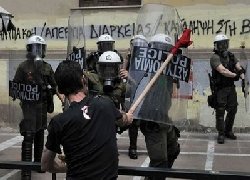Three people have been killed in a petrol bomb attack on a bank in central Athens, as protests in the capital over the government's spending cuts turned violent.
Athens police were put on a "general state of alert" as firemen evacuated around 20 people from the wreckage of a Marfin Bank branch, where two men and a pregnant woman died of asphyxiation.
The building was set on fire after protesters smashed its windows and hurled petrol bombs inside.
George Papandreaou, the Greek prime minister, branded the deaths as "murders", but defended the austerity measures people were protesting.
"We are deeply shocked by the unjust death of these three people, our fellow citizens, who were victims of a murderous act," he said.
But he added: "We took these decisions [spending cuts] to save the country. The alternative would be bankruptcy."
Tens of thousands of people took to the streets on Wednesday to protest against the government's so-called austerity measures, which are aimed at curbing the nation's crippling debt crisis.
But demonstrations turned ugly, Barnaby Phillips, Al Jazeera's correspondent in Athens said, with a small minority "causing a lot of trouble and hijacking the agenda".
"It looked like a pitched battle for quite a while. An awful lot of tear gas used by the police, they would say no doubt to protect the parliament building and perhaps the people in it.
"An awful lot of rocks and debris thrown by the crowd, bins have been set on fire," he said.
'Heated' atmosphere
Groups of protesters pelted police with rocks, chunks of marble and bottles, while officers responded with tear gas and water cannon, clouding the city streets.
Estimates of the number of demonstrators varied from 27,000 to 100,000, making it the biggest protest since Greece was first hit by economic disaster late last year.
Workers, led by members of a communist trade union, beat drums and chanted "don't mess with us" as they marched through the city on Wednesday.
Others chanted "thieves, thieves" as they attempted to storm parliament.
Phillips said the atmosphere was "heated".
"Over the last few days, I've felt that anger is growing in many sectors of Greek society," he said.
Protest leaders have said that although the austerity measures were needed to secure $143bn in loans from the EU and the International Monetary Fund (IMF), poorer Greeks will suffer disproportionately.
"There are other things the [government] can do, before taking money from a retiree who earns 500 Euros [$660] a month," Spyros Papaspyros, leader of the ADEDY civil servants' union, said.
The action came amid a 24-hour nationwide strike that brought transport and public services, including schools, hospitals and tax offices to a standstill.
Aircraft have been grounded, ferries have remained in docks and public transport has been halted.
Economy fears
The general strike is the third to paralyze the country in as many months.
It comes a day before the Greek government plans to push through it austerity measures, imposed as a condition of bail out by the European Union and International Monetary Fund.
Barnaby Phillips said the government was likely to continue with its program, despite Wednesday's violence.
"It's highly unusual within the Greek political context where violence is often quite ritualistic. Clearly, things crossed the line at some stage today, and deaths like these are highly unusual.
"But I don't think the Socialist government feels that it has any choice ... it feels that Greece's debt crisis is such that it cannot back down," he said.
Earlier on Wednesday the European Commission said that Greece's economy is set to contract by three per cent in 2010, in a far gloomier estimate than they delivered in November.
The commission also forecast the country's deficit would be 9.3 per cent of GDP in 2010 and 9.9 per cent in 2011.
The cuts, some of which have already been implemented, will significantly affect civil servants' and pensioners' incomes.
Among the major measures announced on Sunday were a cut in bonus pay for civil servants and retirees; three years more for pension contributions; and the raising of the retirement age for women to 65, the same level as men.
Fears that the crisis could spread caused a fall in Asian markets on Wednesday, as well as European and US markets on Tuesday.
The euro also fell to a one-year low against the dollar during Asian trading.
PHOTO CAPTION
Greek riot policemen clash with protestors in the center of Athens.
Al-Jazeera


 Home
Home Discover Islam
Discover Islam Quran Recitations
Quran Recitations Lectures
Lectures
 Fatwa
Fatwa Articles
Articles Fiqh
Fiqh E-Books
E-Books Boys & Girls
Boys & Girls  Ramadan
Ramadan Fatwa Audios
Fatwa Audios Month of Mercy
Month of Mercy Women
Women Eed Al- Fitr
Eed Al- Fitr Food Recipes
Food Recipes Videos
Videos

 Prayer Times
Prayer Times












